Posted on Tuesday, January 21st, 2020
The Class Representative and Wybourn Awards application process are now open.
Once again, the Class Representative Award allows for three awards; one for each the Perth, Pembroke and Ottawa campuses. The Wybourn award is awarded to one student from any of the three campuses.
- The Wybourn Award is awarded on an annual basis to a Student Leader who has made an outstanding contribution to the promotion and/or upholding of student rights at Algonquin College during the academic year. It consists of a $500 award and an award certificate. The Wybourn Award was created by Algonquin College’s Board of Governors in honour of Dr. Ed Wybourn, the first Dean of Student Affairs.
- The Class Representative Award is awarded on an annual basis and is designed to acknowledge and reward a student who is deemed to be the most deserving Class Representative. An award is selected for each of the three Algonquin College campuses (Ottawa, Perth, and Pembroke). It consists of a $500 award and an award certificate.
The submission deadline for both of these awards is Tuesday, March 10th, 2020, at 5:00 p.m.
All nominations are submitted online and the link to the page to obtain information, criteria and the online application form can be found here.
All award winners and a guest are invited to the Volunteer Appreciation Gala at the Woodroffe Campus. This is a lovely event acknowledging and thanking student volunteers. This year the Gala will be held on Tuesday, March 25, 2020.
Posted on Monday, January 13th, 2020
As you review your new schedules and start to plan out your workload over the semester, you are likely considering how to manage your time, what instructors and services you may need to seek out extra support from, and which subjects and assignments you are going to need to focus more on. It is also important to consider what you may need to best support your mental health over the semester. There, unfortunately, is no “Fitbit” we can wear for our mental health, which would beep if we were at risk for psychological injury, inform us if “what if” thinking was escalating our anxiety, or congratulate us for responding vs. reacting in a situation. Until something like a “mental wellness watch” exists, we have to do this ourselves.
So, are there strategies for managing stress and anxiety that you can start to implement now so that you are less overwhelmed later during the year? I know how hard it can be to learn about strategies for stress or test anxiety when it is exam time. Would you benefit from learning about techniques to manage depression, strong emotions, and low motivation? Will establishing a connection with myself (or others) now help you if you are experiencing distress later on? Especially as the winter weather can lead to isolation, lower activity levels, and even low mood, now is an ideal time to consider what you need to maintain wellness, manage mental health, and limit the impact of mental illness and distress.
To help you start the year off right, the counselling department is continuing to launch initiatives to best support you. You can learn about strategies through the education we have in the waiting area and on the website. You can start to explore coping tools that might come in handy on hard days. I always say that “it’s easier to learn to swim when there aren’t strong waves.” You can start checking in with me to establish a relationship, learn some techniques, and just have a place to get things off your chest. Below is a reminder of the additional ways the counselling department is here to support you.
The COUNSELLING WAITING AREA is an environment for any student to come and decompress throughout the day; it is more than just a waiting area. This is a secluded space with a variety of coping items, including a weighted blanket, kinetic sand, coloring books, and a light therapy lamp (great for during these dark winter months). There are information sheets about stress, panic, and being in crisis, and there are psychoeducation packages for concerns such as depression, anxiety, and general coping. Resource lists and information about community supports are also available.
The PEMBROKE COUNSELLING DEPARTMENT WEBSITE has been updated to include many of the resources available in the waiting area. The psychoeducation packages currently available are: Stress Management; Anxiety Management; Depression Management; Coping and Distress Tolerance; and Trauma and Acute Stress. algonquincollege.com/pembroke/counselling
WIN COUNSELLING CLINICS start up this week, between 1 pm-4 pm on Tuesday, January 14th and Thursday, January 16th. WIN = What’s Important Now? These clinics will consist of 6x 30-minute same-day appointments available for students who have immediate needs they want to address, or an issue they don’t need a regular, longer appointment for. You need to sign-up the morning of, between 8 am-12 pm or you can try dropping in during the afternoon to see if a spot is still free. Information and the sign-up sheet is located in the back of Student Services, in the counselling waiting area. You can use these clinics even if you have not met with me before. Regular appointments will be available on Mondays, Wednesdays, and Fridays.
Posted by Shannon Sevigny, Counsellor
Community & Student Affairs, Algonquin College
1 College Way, Pembroke ON K8A OC8
T: 613-735-4700 ex. 2804
F: 613-735-8805
sevigns@alqonquincollege.com
Posted on Friday, January 10th, 2020
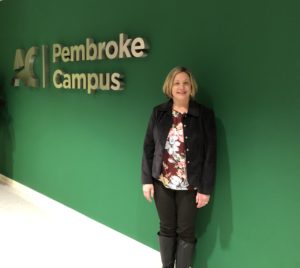 Since 2004, Jennifer Austin and her family have hosted out of town college and high school students in their home. Now, she has become a champion for Algonquin College’s efforts to attract more international students to its Pembroke Waterfront Campus. Austin has signed on to host an international student for the Fall 2020 term because she says “Homestay is a meaningful experience that empowers students to succeed, and it helps you learn a new culture and meet a new friend for life.”
Since 2004, Jennifer Austin and her family have hosted out of town college and high school students in their home. Now, she has become a champion for Algonquin College’s efforts to attract more international students to its Pembroke Waterfront Campus. Austin has signed on to host an international student for the Fall 2020 term because she says “Homestay is a meaningful experience that empowers students to succeed, and it helps you learn a new culture and meet a new friend for life.”
The College has partnered with Canadian Accommodation Services to establish a Homestay program in Pembroke that encourages families to open up their homes to international students. For Austin, it was an easy decision to participate in the program. Her family has hosted high school students from across Canada including the Northwest Territories and Nunavut, and from as far away as New Zealand, normally for six months to full year stays. In all, the Austin family has provided a home for 15 students over the years.
“The most rewarding part of being a host family is the bonds that are formed. Each student creates a different bond with our family. It could be something special like inside family jokes or cherished memories of time spent together,” says Austin.
 In recent years, the Pembroke Campus has been gradually attracting more international students. These students have come to the campus from several countries including India, China, the United States, Morocco, Ukraine, and Africa. The students study in many programs and have come to Canada because of our country’s excellent reputation for providing high-quality post-secondary training and also its openness to welcoming people from around the world.
In recent years, the Pembroke Campus has been gradually attracting more international students. These students have come to the campus from several countries including India, China, the United States, Morocco, Ukraine, and Africa. The students study in many programs and have come to Canada because of our country’s excellent reputation for providing high-quality post-secondary training and also its openness to welcoming people from around the world.
“Diversity enriches everyday life. These students have traveled around the world on an adventure, and we get to be part of it,” says Austin who is now collaborating with the College to find other families who are interested in taking part in the Homestay program. As a supporter of the work the College is doing to promote cultural diversity, 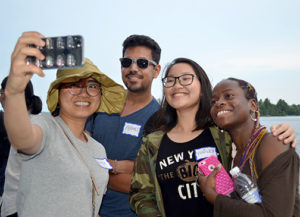 Austin speaks passionately about why she has stepped up to help the Pembroke Campus and has offered some simple advice to other families who are considering hosting an international student.
Austin speaks passionately about why she has stepped up to help the Pembroke Campus and has offered some simple advice to other families who are considering hosting an international student.
“Host with open arms and an open heart. Show your student a new perspective, a new culture and be ready to learn something new yourself,” says Austin who is excited to recruit more families. More information on the Homestay program is available on the campus website, including the application form.
Posted by Jamie Bramburger, Manager of Community and Student Affairs
Posted on Thursday, January 9th, 2020
 #DidYouKnow that we offer WIN Counselling Clinics for students? WIN = What’s Important Now? These clinics consist of 6x 30-minute appointments available for students who have immediate needs they want to address, or an issue they don’t need a regular, longer appointment for. These clinics will be every Tuesday and Thursday afternoon from 1 pm-4 pm. Students need to sign-up the morning of, between 8 am-12 pm. Information and the sign-up sheet is located in the back of Student Services, in the counselling waiting area. Check out our Counselling resources.
#DidYouKnow that we offer WIN Counselling Clinics for students? WIN = What’s Important Now? These clinics consist of 6x 30-minute appointments available for students who have immediate needs they want to address, or an issue they don’t need a regular, longer appointment for. These clinics will be every Tuesday and Thursday afternoon from 1 pm-4 pm. Students need to sign-up the morning of, between 8 am-12 pm. Information and the sign-up sheet is located in the back of Student Services, in the counselling waiting area. Check out our Counselling resources.
Posted on Thursday, January 2nd, 2020
What’s a better investment? Buying a new car or enrolling in a college program? The answer is very obvious, but too many families don’t hesitate to finance a vehicle, but they second guess the cost of post-secondary education.
Simpl y put, buying a car is a short term purchase while enrolling in post-secondary education is a life long investment in your future.
y put, buying a car is a short term purchase while enrolling in post-secondary education is a life long investment in your future.
Society has been programmed to believe that higher education is expensive and out of reach for many families, but that couldn’t be further from the truth. The recent transformation of the Ontario Student Assistance Program has made access to post-secondary training greater than it has ever been.
More grants are available for students with lower incomes, the threshold for family income eligibility for student loans has increased and the application process has been simplified. Moving forward, students will also have a much clearer picture of what their investment will need to be in their education, allowing families to have better information sooner to make their plans for college.
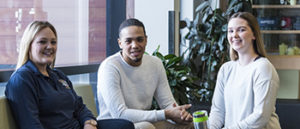
The next time you see the sticker price of $25,000 or $30,000 on a new vehicle that is tempting you, just think how that money could be better spent on earning a post-secondary credential that will carry its value for the rest of your life. Going to college is often a life-changing experience for a student that propels them into a career with higher lifetime earnings, more employment opportunities, enhanced confidence, and eventually more disposable income for things like new cars.
The bottom line is a higher education credential doesn’t depreciate and if you commit to life-long learning, you’ll continue to open doors for yourself. The little black book is a certificate, diploma or degree that will maintain its value and never run out of gas.
Need more convincing, check out Algonquin College’s graduate placement report.
Posted on Thursday, January 2nd, 2020
Sean Kyte was hoping for a better result. He had represented Canada at the World Deaf Hockey Championships in 2017 in Buffalo, New York and had felt the sting of losing in the gold medal game to the United States, but two years later he was confident his team could beat the Americans.

L to R: Thomas Kyte, Johnny Kyte, Sean Kyte
Kyte, along with two of his cousins, Thomas and Johnny Kyte, had made the Canadian team that had travelled to Chiavenna, Italy to play against the best hearing impaired hockey players in the world at the Winter Deaflympics hockey tournament. To participate, players must have a minimum hearing loss of 55 decibels in the better of their two ears.
Through the round-robin, the Canadian team cruised to four consecutive wins, beating Russia 3-1, Finland 5-1, Kazakhstan 18-0 and the United States 4-1. The undefeated record, including the win against the Americans, gave the Canadians confidence they could prevail in the gold medal game. Unfortunately, that confidence was shattered as the Americans took command of the game early and won 7-3, meaning Kyte and his teammates would again have to settle for a silver medal.
“After losing to the U.S. two years ago, and losing again this year, it was really heartbreaking. It was a hard pill to swallow, but it was an unbelievable experience,” says Kyte.
Part of that experience was playing in an arena that offered a breathtaking open-air view of the Alps. The arena had seating on only one side, and while the playing surface was covered, the other side of the building faced the mountains and was wide open, providing a picturesque setting for the championship game that was played in front of a sold-out crowd.
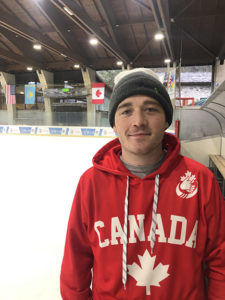
“It was stunning. Sitting on the bench, you could see the mountains across from you, which is something I will never forget,” says Kyte.
Players were not permitted to wear their hearing aids during games, so in addition to whistles, strobe lights were used to alert the players of a stoppage in play. The arena also had only one door on the player’s bench, making it more difficult to make line changes.
Hearing impairment is prevalent within the Kyte family. Sean’s father, Murray Kyte, also has hearing loss and won a bronze medal when he played in the tournament several years ago in Russia, while his Uncle Frayne Kyte won a gold medal in Switzerland. Sean’s Uncle, Jim Kyte, was the first deaf player in the National Hockey League, and through his 16-year professional career and following his retirement as an athlete, he continues to be a great advocate for deaf athletes.
Kyte is a double graduate of Algonquin College. He completed the Construction Techniques program (now Carpentry and Renovation Techniques) at the Pembroke Campus after graduating from high school, picking up some fundamental carpentry skills that have turned him into a “handyman,” for his family and friends. He then enrolled at Saint Francis Xavier University in Antigonish, Nova Scotia where he earned a Business Degree, but his educational journey at Algonquin College wasn’t over.
His passion for sports led him to enroll in the post-graduate Sports Business Management program at the Ottawa Campus. “I knew I wanted to work in a career that centred around sports,” says Kyte, who landed his first job with a start-up company called “Fan Saves.”
Fan Saves has developed a mobile sports application that helps companies promote their products and sell them to support local sports teams and organizations. The app gives users discounts and deals from brands affiliated with their favourite clubs and businesses, whether it be a local baseball team or a professional hockey club.
For Kyte, it has been exciting to be in at the ground level of the new company and watch it grow. With the title of business development executive, Kyte spends plenty of time on the road and making pitches to prospective clients. “It has been a blessing to be able to work within the sports industry while learning every day about the app world within business,” says Kyte.
To be able to play for Canada at the Deaflympics, Kyte required the support of his employer as he needed to be away from work to attend tryouts and training camp, plus travel to Italy to compete in the tournament. He was grateful to have had the opportunity to again play against the best deaf hockey players on the planet, but he is not satisfied with having two silver medals under his belt. He is still craving a gold medal.
In 2021, the World Deaf Hockey Championships will be played on Canadian soil in Vancouver, a city that has a golden hockey history, having hosted Sidney Crosby’s “golden goal” in the 2010 Winter Olympics. If Kyte can again make the team, he hopes Crosby’s game-winning overtime marker against the Americans will provide the inspiration for Canada’s deaf team to win it all. If that happens, it will truly be a golden moment for both him and his country.
Posted on Tuesday, December 31st, 2019
We asked some former Pembroke Waterfront Campus, first-year students, what survival tips they thought you would benefit from…some insider info! Here are your Top 10 Survival Tips from fellow student:
- Be proactive, surround yourself with positivity – be a star.
- Love your program, get involved – don’t be a tourist.
- Milk your instructors for their knowledge & expertise – know your learning style.
- Go to class, do assigned homework – learn new study habits.
- Stay clear of distractions, be focused – commit to a standard.
- Know your budget – apply for bursaries.
- Tap into available resources – talk to your coordinator or a support services staff member and visit the Students’ Association.
- Plan ahead. Your agenda is your bible – use your resources.
- Buy a watch, know the time and what you are doing next – be 5 minutes early.
- Ask questions, be in the know – read your email daily.
Posted on Friday, December 13th, 2019
When considering attending college, most prospective students associate the start of the school year with the fall, but there are also opportunities to begin post-secondary studies in the winter. In fact, Algonquin College leads the Canadian college system in online student registrations, but for students who prefer more traditional face-to-face classroom training, here are some options available this winter at the Pembroke Campus.
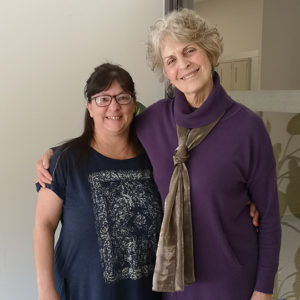
Academic Upgrading offers opportunities for students who are considering enrolling in a full-time college program to pick up pre-requisites that will help them meet admissions requirements. These courses are normally free for Ontario residents and can really help a student prepare for the rigor of post-secondary studies. Some students may have the admission requirements, but they have been removed from formal education for several years, and a refresh of their English, math or science skills can really prepare them for a college program.
Many of the courses offered in Academic Upgrading are available on a continuous intake cycle, meaning students can join classes at any time. This is very convenient for learners and with the help of an academic advisor, the students can carve out a plan that sets them up for a successful college experience.
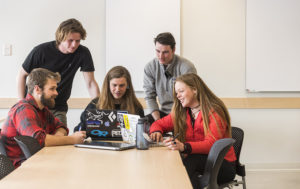 Some students have plans to study in a specific vocational program, but because the program doesn’t start until the fall they enroll in the General Arts and Science program. This can be a very smart move for many students as they can customize their timetable to pick up credits that can be applied to other college programs. This lessens the student’s workload when they enroll in future programs as they have exemptions. Students can also enroll as a part-time student, a tactic often used by junior hockey players who are under consideration for an athletic scholarship at a university.
Some students have plans to study in a specific vocational program, but because the program doesn’t start until the fall they enroll in the General Arts and Science program. This can be a very smart move for many students as they can customize their timetable to pick up credits that can be applied to other college programs. This lessens the student’s workload when they enroll in future programs as they have exemptions. Students can also enroll as a part-time student, a tactic often used by junior hockey players who are under consideration for an athletic scholarship at a university.
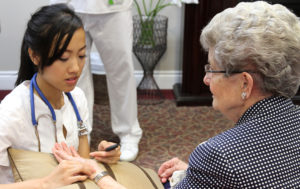
Personal support workers (PSW) are in high demand and Algonquin College is again collaborating with the County of Renfrew to offer a PSW program, beginning in January at Bonnechere Manor in Renfrew. With jobs plentiful in the field, the extra offering will help employers throughout the County meet their labour market needs. Many of these health care organizations have expressed concern over their difficulty in hiring PSWs as there is currently a shortage of these frontline health care workers.
The College is also offering a pre-apprenticeship electrical program at its Pembroke Campus this winter. This six-month program provides students with an opportunity to complete level one of the electrical apprenticeship theory course and includes a paid workplace experience within the electrical field. Pre-apprenticeship programs are free to students but are highly competitive as they draw a significant number of applications.
Finally, high school students can get a head start on college by enrolling in a Dual Credit course. Each year Algonquin College offers several of these courses in the fall and winter terms. A Dual Credit is a college course that high school students can enroll in, and if successful, they can earn both a college and a high school credit. It is a great way for high school seniors to transition to post-secondary education.
More information on all of the options that are available to students this winter can be found on the college website at www.algonquincollege.com/pembroke or by visiting the Pembroke Campus and speaking to an admissions officer. It’s never too early or too late to be planning your educational journey.
Posted on Monday, November 4th, 2019
Aiden Maher knew it was going to be a long day when he arrived at six o’clock in the morning on November 1st at TD Place field. The Ottawa REDBLACKS were playing that evening and after a day of pelting rain and high winds, Maher understood the field would need a lot of work to get it ready for the team’s final home game of the season.
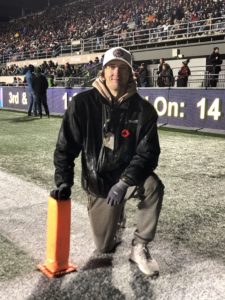 The 23-year old Petawawa native had moved to Ottawa five years earlier to secure consistent work as a carpenter, but when he saw an advertisement for a job with Ottawa Sports and Entertainment Group, he applied and landed a position helping to set up and tear down major events like concerts. He was working part-time in carpentry but thought the extra hours working in the entertainment business would help pay the bills.
The 23-year old Petawawa native had moved to Ottawa five years earlier to secure consistent work as a carpenter, but when he saw an advertisement for a job with Ottawa Sports and Entertainment Group, he applied and landed a position helping to set up and tear down major events like concerts. He was working part-time in carpentry but thought the extra hours working in the entertainment business would help pay the bills.
After a few months on the job, Maher was asked, if he would be interested in helping the field preparation crew. He was curious about the work and once he started doing it, he really enjoyed it. He has now been doing it for five years as one of the organization’s leading Playing Surface Technicians, responsible for painting on both the TD Place field and the ice at the Ottawa Civic Centre.
“It’s a job that can be very demanding”, but Maher loves it. There is a lot of precision to the painting, whether it’s using a stencil to complete the Canadian Football League logo or it’s painting the numerals on the 110-yard long field. “There are some similarities in the carpentry work that I do in that you have to be really focussed to do the job well. Concentration is important,” says Maher.
After graduating from General Panet High School, Maher had enrolled in a pre-apprenticeship Construction Trades program at Algonquin College’s Pembroke Waterfront Campus in 2015. The program lasted six months and allowed Maher to complete level one of the theory portion of the carpenter apprentice training program. Students in the program also received a work placement experience, including a large group assignment to re-build Pembroke’s aging waterfront boardwalk.
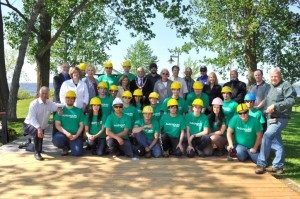
“I enrolled because the program was free and I was always doing carpentry work when I was a kid. It was a great experience and got me started in my career,” says Maher. After finishing the program, Maher quickly found work in his trade, but when he was laid off from his job, he and his sister decided to move to the nation’s capital.
His first focus was on finding someone who would take him on as an apprentice so he could continue to hone his skills as a carpenter. It didn’t take long to find a small company that hired him on a part-time basis. That arrangement afforded him the opportunity to look for other work and that’s how he found himself on the sidelines of TD Place Field, keeping a watch on the playing surface.
On game nights, he blends in with the many other team officials who are watching from field level, standing near his alma mater, the Algonquin College Loggersports team. But, there is one thing that stands out. On this cold November night, it’s his jacket, covered in paint streaks, recognition of a hard day’s work.
Posted by Jamie Bramburger, Manager of Community and Student Affairs
Posted on Sunday, October 27th, 2019
Every year, Algonquin College celebrates the incredible achievements of its alumni through the Alumni of Distinction Awards. These awards honour the extraordinary contributions our graduates make to the community while achieving career success. Here is a closer look at the Recent Graduate award recipient.
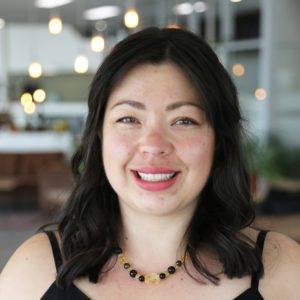 Community is vital to Naomi Fong. When she speaks about her two years studying at the Pembroke Campus of Algonquin College, one of the things she highlights is the extraordinarily tight community she formed with her fellow students in the Social Service Worker program. Even now, you can hear the enthusiasm in her voice as she speaks about this special time in her life.
Community is vital to Naomi Fong. When she speaks about her two years studying at the Pembroke Campus of Algonquin College, one of the things she highlights is the extraordinarily tight community she formed with her fellow students in the Social Service Worker program. Even now, you can hear the enthusiasm in her voice as she speaks about this special time in her life.
Originally, she planned to study in a different program at the Ottawa campus. But when she looked into becoming a Social Service Worker at Pembroke, she saw a natural fit with her interests and her personal priorities. She wanted to learn how to help others and at the same time learn more about herself. She wanted to develop the confidence to be a full contributor to group work, to stand and speak in public, and to earn her credentials.
“My studies helped me come into my own skin and be confident and tell my story safely in a way that I hope can help others,” she says.
Naomi’s story is a difficult one to hear — but one she wants you to know. The nine-year veteran of the Canadian Armed Forces, now retired, was sexually assaulted while she was in the military. The attacks devastated her physically and mentally. One incident in particular that contributed to her Post-Traumatic Stress Disorder (PTSD) resulted in a physical injury that denied her one of her fondest wishes: to serve her country overseas. The former Bombardier is proud of her achievements in domestic operations serving Canada and the military but she says she will always regret that an overseas posting eluded her.
The assault completely altered her personal and professional trajectory. She says she went from being a proud member of the military to someone chain-smoking alone in her basement and refusing to come out into the light. It has only been gradually and with considerable help from the College and others that she has been restored to something like normal life. She describes the ongoing process as years of taking small steps in order to cope with the negative cycles that accompany PTSD.
One of her first initiatives involved taking a yoga teacher training course, where she rediscovered the sense of community she had once enjoyed in the military.
“Then I stepped into the College, and I found another community where you look at who you are and where you want to be, and there are people to help you get there academically and in terms of your mental health. I received a lot of support from my colleagues and professors and the Centre for Accessible Learning; they were there for me when I needed them.”
What the honours graduate gained through her studies, she says, now helps her tie everything together: she uses what she learned and experienced at the College in her dealings with other people when she’s speaking in public when she is making decisions about what comes next in her life.
One of those decisions after completing her diploma involved joining 39 Canadians competing in 13 sports at the 2018 Invictus Games in Sydney, Australia in October 2018. The games, an international event founded by Prince Harry, Duke of Sussex, showcases the physical accomplishments of wounded and injured armed service personnel and veterans from around the world. Fong, a dedicated athlete who can be found daily at the gym, took home two bronze medals in the Women’s Road Cycling competitions, competed in three other sports, and was the Team Canada flag bearer at the opening ceremonies.
Fong says despite a disability and obstacles she is becoming “one per cent better every day.” She maintains a Facebook page promoting her values of fitness and creative expression. She says Algonquin College gave her a platform to practice making presentations and acquire confidence when speaking in public, and she believes that might provide a pathway to her next career.
“Talking about mental health and mental illness is a way forward. It’s healing for the speaker and for the listener. My education is helping me tell my story. If I can take what I learned and help others if I can help them feel safe and know they aren’t defined by their injury — maybe that will be my way to make a difference.”



 #DidYouKnow that we offer WIN Counselling Clinics for students? WIN = What’s Important Now? These clinics consist of 6x 30-minute appointments available for students who have immediate needs they want to address, or an issue they don’t need a regular, longer appointment for. These clinics will be every Tuesday and Thursday afternoon from 1 pm-4 pm. Students need to sign-up the morning of, between 8 am-12 pm. Information and the sign-up sheet is located in the back of Student Services, in the counselling waiting area. Check out our
#DidYouKnow that we offer WIN Counselling Clinics for students? WIN = What’s Important Now? These clinics consist of 6x 30-minute appointments available for students who have immediate needs they want to address, or an issue they don’t need a regular, longer appointment for. These clinics will be every Tuesday and Thursday afternoon from 1 pm-4 pm. Students need to sign-up the morning of, between 8 am-12 pm. Information and the sign-up sheet is located in the back of Student Services, in the counselling waiting area. Check out our 




 Some students have plans to study in a specific vocational program, but because the program doesn’t start until the fall they enroll in the
Some students have plans to study in a specific vocational program, but because the program doesn’t start until the fall they enroll in the 


